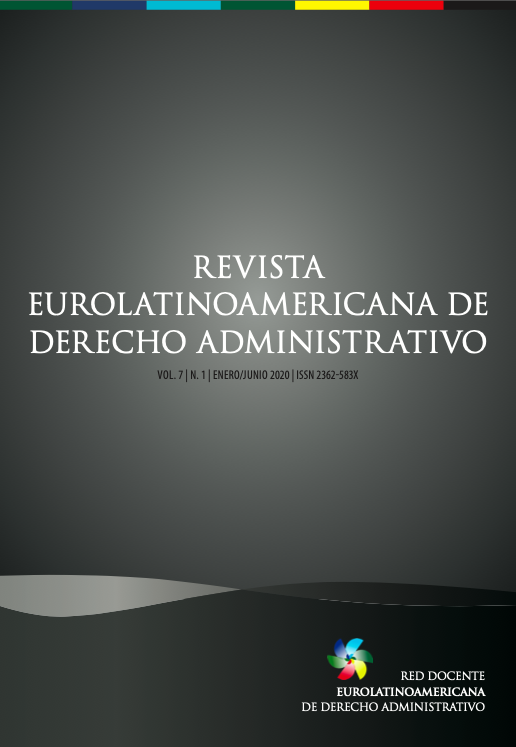The Organization of the Judicial System in Italy
DOI:
https://doi.org/10.14409/redoeda.v7i1.8716Palabras clave:
Italia, sistema judicial, ministerio de justicia, independencia judicial, administraciónResumen
Este trabajo ofrece una visión completa de la organización del sistema judicial en Italia con el objetivo de examinar las relaciones entre los distintos órganos que operan en su ámbito. Asimismo, analiza la estructura y las funciones de todos los órganos que intervienen de diversas maneras en la administración de justicia: el Ministerio de Justicia, que ejerce esencialmente competencias organizativas y que tiene la misión de garantizar la eficacia global del sistema; los órganos de autogobierno de la judicatura, que garantizan su independencia respecto de otros poderes del Estado; y las oficinas judiciales únicas diseminadas por la península. Se dedica una atención especial al complejo sistema regulado por las leyes establecidas para prever los procedimientos disciplinarios y de valoración de puestos de trabajo, que implican tanto la eficacia de los jueces como su relación con los órganos que intervienen en la administración del sistema.
Citas
DI FEDERICO, Giuseppe. “Lottizzazioni correntizie” e politicizzazione del CSM: quali rimedi? Quaderni costituzionali, n 2, p. 279-297, 1990.
FERRARI, G. Consiglio Superiore della Magistratura, autonomia dell’ordine giudiziario e magistrati. In Studi in onore di C. Esposito. Padova, 1974.
GAROUPA, Nuno, GINSBURG, Tom. The comparative Law and Economics of Judicial Councils, Berkely Journal of International Law, n. 53, 2008.
ITALY. Presidenza della Repubblica italiana. R.d.lgs. 511/1946. Available at: http://presidenza.governo.it/USRI/magistrature/norme/dlvo511_1946.pdf
ITALY. Parlamento della Repubblica Italiana. Legge 195/1958. Available at: https://www.normattiva.it/uri-res/N2Ls?urn:nir:stato:legge:1958.
ITALY. Corte costituzionale della Repubblica italiana. Sentenza 168/1963. Available at: https://www.giurcost.org/decisioni/1963/0168s-63.html
ITALY. Presidenza della Repubblica italiana. Decreto legislativo n. 190/1970. Available at: https://www.giurcost.org/decisioni/1970/0190s-70.html
ITALY. Parlamento della Repubblica italiana. Legge 695/1975. Available at: https://www.gazzettaufficiale.it/eli/id/1975/12/31/075U0695/sg
ITALY. Presidenza della Repubblica italiana. Decreto legislativo n. 72/1991. Available at: https://www.parlamento.it/parlam/leggi/deleghe/99300dl.htm.
ITALY. Presidenza della Repubblica italiana. Decreto legislativo n. 300/1999. Available at: https://www.parlamento.it/parlam/leggi/deleghe/99300dl.htm.
ITALY. Parlamento della Repubblica italiana. Legge 44/2002. Available at: https://www.camera.it/parlam/leggi/02044l.htm,
ITALY. Corte costituzionale della Repubblica italiana. Sentenza 379/2002. Available at: https://www.giurcost.org/decisioni/2004/0379s-04.html
ITALY. Corte costituzionale della Repubblica italiana. Sentenza 380/2003. Available at: https://www.giurcost.org/decisioni/2003/0380s-03.html
ITALY. Corte costituzionale della Repubblica italiana. Sentenza 200/2006. Available at: https://www.cortecostituzionale.it/actionSchedaPronuncia.do?anno=2006&numero=200
ITALY. Parlamento della Repubblica Italiana. Decreto Legge 25/2006. Available at: https://www.camera.it/parlam/leggi/deleghe/testi/06025dl.htm
ITALY. Presidenza della Repubblica italiana. Decreto legislativo n. 159/2011. Available at: https://www.bosettiegatti.eu/info/norme/statali/2011_0159.htm.
ITALY. Costituzione della Repubblica Italiana, 1947.
LURIE, A. REICHMAN, SAGY, Y. The Regulation of Judges: Institutional Realisms and the Hidden Importance of Agencification, The Regulation of Judges, 2016.
MERLINI, Stefano. Il Consiglio Superiore della Magistratura, la Costituzione e la democrazia, Quale giustizia. 1971.
MORTATI, Costantico. Istituzioni di diritto pubblico. Padua, 1969.
VOERMANS, Wim; ALBERS, Pim. Councils for the Judiciary in EU Countries. Strasbourg, 2003. Available at SSRN: https://ssrn.com/abstract=1271182
ZAGREBELSKY, Gustavo. Amnistia, indulto, grazia. Imprenta: Milan, 1974
Descargas
Publicado
Cómo citar
Número
Sección
Licencia
Autores que publican en esta revista están de acuerdo con los siguientes términos:
- Autores mantienen los derechos autorales y conceden a la revista el derecho de primera publicación, con el trabajo simultáneamente licenciado bajo la Creative Commons - Atribución 4.0 Internacional que permite compartir el trabajo con reconocimiento de la autoría y publicación inicial en esta revista.
- Autores tienen autorización para asumir contratos adicionales separadamente, para la distribución no exclusiva de la versión del trabajo publicada en esta revista (ej.: publicar en repositorio institucional o como capítulo de libro), con reconocimiento de autoría y publicación inicial en esta revista.
- Autores tienen permiso y son estimulados a publicar y difundir su trabajo online (ej.: en repositorios institucionales o en su página personal) a cualquier punto antes o durante el proceso editorial, ya que esto puede generar alteraciones productivas, así como aumentar el impacto y la citación del trabajo publicado (Véase El Efecto del Acceso Libre).



























.png)





